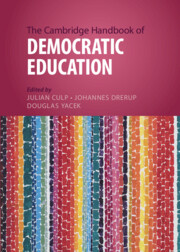Book contents
- The Cambridge Handbook of Democratic Education
- Cambridge Handbooks in Education
- The Cambridge Handbook of Democratic Education
- Copyright page
- Contents
- Contributors
- Acknowledgments
- Introduction
- 1 What Is Democratic Education and Why Should We Care?
- Part One Historical Perspectives
- Part Two Philosophical and Normative Foundations
- Part Three Key Topics and Concepts
- Part Four Challenges
- Index
- References
1 - What Is Democratic Education and Why Should We Care?
from Introduction
Published online by Cambridge University Press: 20 April 2023
- The Cambridge Handbook of Democratic Education
- Cambridge Handbooks in Education
- The Cambridge Handbook of Democratic Education
- Copyright page
- Contents
- Contributors
- Acknowledgments
- Introduction
- 1 What Is Democratic Education and Why Should We Care?
- Part One Historical Perspectives
- Part Two Philosophical and Normative Foundations
- Part Three Key Topics and Concepts
- Part Four Challenges
- Index
- References
Summary
Democratic education is central to the functioning and flourishing of modern multicultural democracies, and yet it is subject to increasing public controversy and political pressure. Waning public trust in government institutions, sustained attacks on democratic values and customs from populist politicians and organizations, political sectarianism, and increasing trends toward privatization and chartering in the educational landscape have placed immense strain on the existing structures of public education and generally worked to undermine public confidence in democratic education. In light of these developments, it seems to us to be of central importance to return to the essential concepts, theories and values of democratic education, both as a social ideal and a political institution. This Handbook aims to offer an expansive view of the formation of individuals for democratic life and includes a diversity of theoretical traditions, topics, and thinkers that are relevant to the theory and practice of democratic education.
- Type
- Chapter
- Information
- The Cambridge Handbook of Democratic Education , pp. 3 - 10Publisher: Cambridge University PressPrint publication year: 2023

